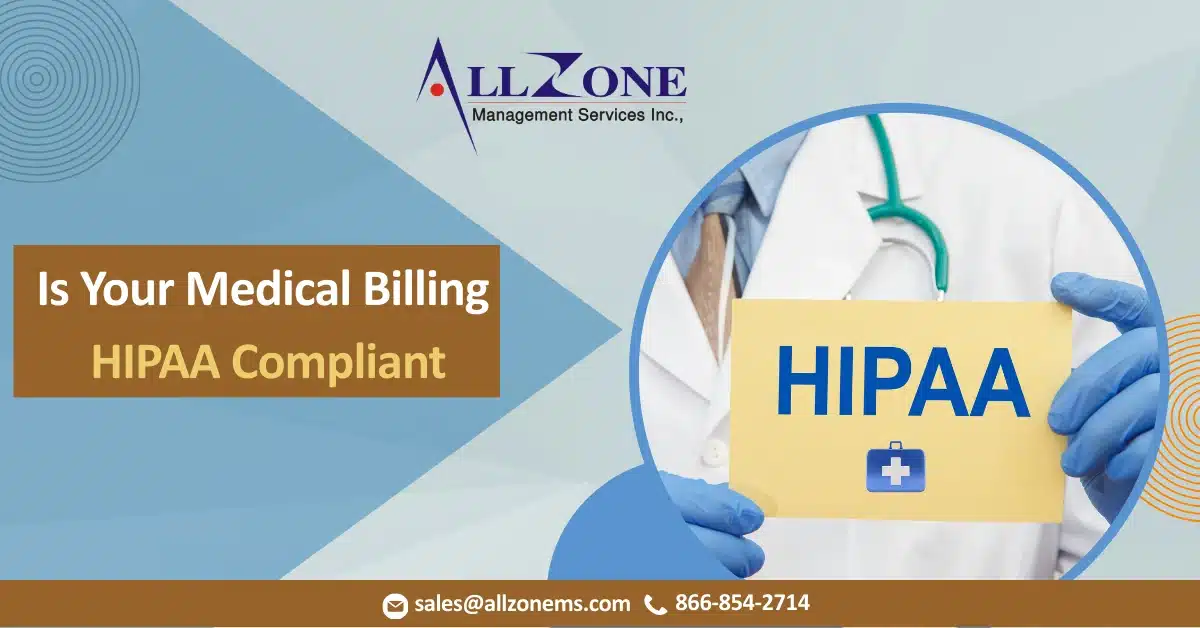The Health Insurance Portability and Accountability Act (HIPAA) sets the national standards for safeguarding protected health information (PHI). For healthcare providers, ensuring HIPAA compliance in medical billing isn’t just a regulatory requirement—it’s an essential part of patient trust, financial integrity, and organizational reputation.
Many practices struggle to maintain compliance while also managing the complexity of billing. Outsourcing to trusted partners like Allzone Management Services (Allzone MS) can simplify this challenge, helping providers reduce errors, avoid penalties, and focus more on patient care.
This guide explores what HIPAA compliance means for medical billing, why it matters, and how outsourcing can be a smart solution.
Why HIPAA Compliance Matters in Medical Billing
Medical billing involves handling large volumes of sensitive patient data—from demographics and diagnosis codes to treatment details and insurance information. Without proper safeguards, this information can be exposed to cyberattacks, misuse, or unintentional breaches.
HIPAA compliance in billing ensures that:
- Patient privacy is protected from unauthorized access.
- Financial penalties for violations (which can range from thousands to millions of dollars) are avoided.
- Trust is built with patients, insurers, and regulatory bodies.
- Operational risks such as fraud, identity theft, or data leaks are minimized.
For providers, failing to comply can result in significant consequences, including legal actions, reputational harm, and loss of patients’ confidence.
Key HIPAA Requirements in Medical Billing
To remain compliant, medical billing processes must adhere to HIPAA’s Privacy Rule, Security Rule, and Enforcement Rule. Here’s how these apply to billing:
1. Privacy Rule
- Protects PHI from being shared without patient authorization.
- Limits access to patient information to only those who need it for billing purposes.
2. Security Rule
- Requires safeguards for electronic PHI (ePHI), including:
- Administrative safeguards (policies, workforce training, risk assessments).
- Technical safeguards (encryption, secure logins, access controls).
- Physical safeguards (secure workspaces, restricted access to servers).
3. Enforcement Rule
- Establishes penalties for non-compliance, ranging from $100 to $50,000 per violation depending on the level of negligence.
Common HIPAA Violations in Medical Billing
Despite best intentions, many practices unknowingly fall into non-compliance. Common violations include:
- Sending patient data through unsecured email.
- Storing billing records without encryption.
- Allowing unauthorized staff access to billing software.
- Failing to train staff on HIPAA protocols.
- Partnering with third-party billing companies that do not follow HIPAA standards.
Even a single violation can trigger audits and penalties, making prevention a top priority.
The Role of Outsourcing in HIPAA-Compliant Billing
Managing compliance internally can be overwhelming, especially for smaller practices with limited staff and IT resources. That’s where outsourcing to a trusted medical billing company like Allzone MS makes a difference.
Benefits of Outsourcing:
- Expertise in HIPAA Compliance
Outsourced billing companies stay up to date with evolving HIPAA regulations, ensuring your processes remain compliant. - Secure Technology Infrastructure
Companies like Allzone MS invest in advanced encryption, secure servers, and access control systems to protect ePHI. - Error Reduction and Audit Readiness
With specialized compliance teams, outsourced providers minimize coding/billing errors and ensure thorough documentation for audits. - Cost Savings
Avoid penalties, reduce administrative overhead, and free up staff time by outsourcing compliance-heavy billing tasks. - Focus on Patient Care
Providers can shift their attention from regulatory worries to delivering high-quality healthcare.
Why Choose Allzone Management Services (Allzone MS)?
When it comes to outsourcing, not all billing partners are equal. Healthcare providers need a trusted partner with a proven track record in HIPAA compliance and billing accuracy.
Allzone MS ensures:
- Strict adherence to HIPAA and other healthcare regulations.
- Secure handling of all PHI with advanced encryption and monitoring.
- Comprehensive staff training in compliance protocols.
- Customized solutions for practices of all sizes, from solo providers to large healthcare systems.
- Reduced claim denials and improved revenue cycle efficiency.
With over a decade of experience in medical billing services, Allzone MS is committed to delivering compliance-driven results that maximize reimbursements and minimize risks.
Best Practices for Providers to Ensure Compliance
Even when outsourcing, providers play a key role in compliance. Here are some essential steps to follow:
- Conduct regular risk assessments to identify vulnerabilities in data handling.
- Use secure communication channels for patient and billing information.
- Review Business Associate Agreements (BAAs) with all billing partners to ensure shared compliance responsibility.
- Provide staff training on HIPAA guidelines and incident reporting.
- Monitor outsourced partners to confirm ongoing adherence to regulations.
Final Thoughts
HIPAA compliance in medical billing isn’t optional—it’s a fundamental responsibility for every healthcare provider. With increasing regulatory scrutiny and rising cyber threats, practices cannot afford to take risks with patient data.
By outsourcing to a trusted partner like Allzone MS, providers gain peace of mind knowing their billing processes are secure, efficient, and compliant. This not only protects patients but also enhances financial performance and operational stability.
Is your medical billing HIPAA compliant? If you’re unsure, it may be time to consider outsourcing to experts who make compliance their priority.

